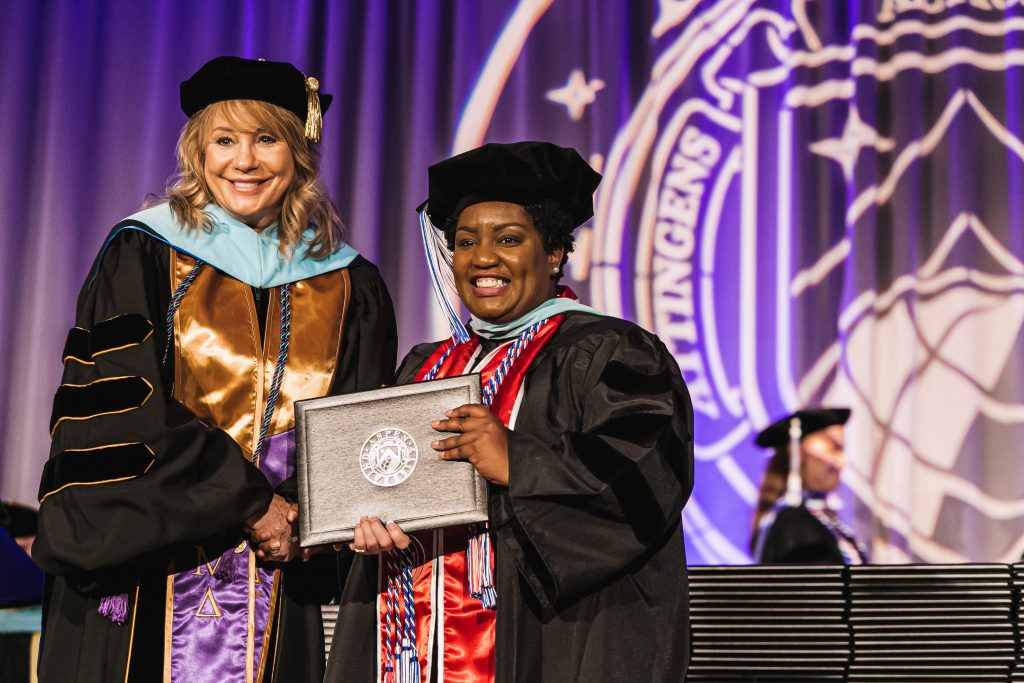This guide will help break down the details of Ed.D. vs. Ph.D., so you can choose the degree program that is right for you.
The number of doctoral degree holders is on the rise. According to the U.S. Census Bureau’s Educational Attainment in the United States: 2018, since 2000, the number of people ages 25 and older whose highest degree was a doctoral degree has more than doubled to 4.5 million.
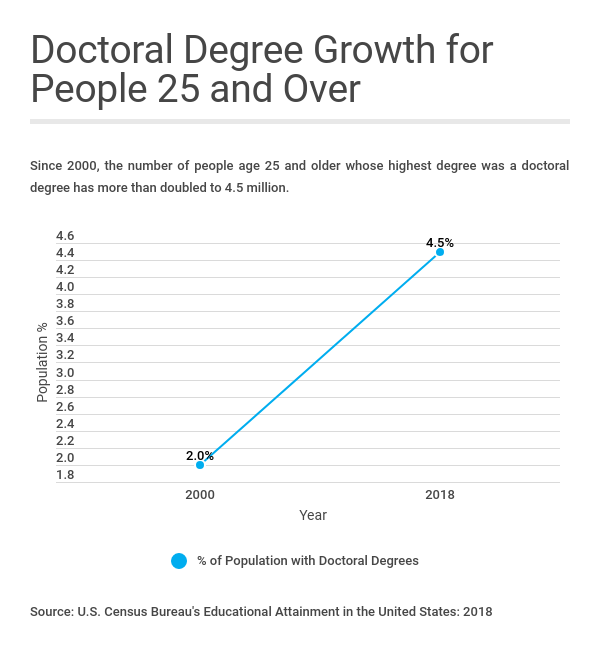 Doctoral degrees fall under 3 categories: doctor’s degree-research/scholarship, doctor’s degree-professional practice, and doctor’s degree-other.
Doctoral degrees fall under 3 categories: doctor’s degree-research/scholarship, doctor’s degree-professional practice, and doctor’s degree-other.
What Is a Research/Scholarship Doctoral Degree?
According to the U.S. Department of Education’s National Center for Educational Statistics (NCES), the doctor’s degree-research/scholarship “requires advanced work beyond the master’s level, including the preparation and defense of a dissertation based on original research, or the planning and execution of an original project demonstrating substantial artistic or scholarly achievement.”
“The primary purpose of doctoral research — the highest level of research in academia — is to synthesize existing literature and theoretical frameworks, and design and contribute new knowledge to the field,” says Dr. Eva Ballard, Dean of Aspen University School of Education. “A secondary purpose of doctoral research is to teach candidates the scientific approach to conducting research. Doctoral programs include coursework in research methodologies discussing how to conduct qualitative research such as interviews, quantitative research such as surveys, statistical analyses, and laboratory experiments.”
Examples of Research Doctorates
- Doctor of Philosophy (Ph.D.)
- Doctor of Education (Ed.D.)
- Doctor of Nursing Practice (DNP)
- Doctor of Computer Science (DCS)
What Is a Professional Practice Doctoral Degree?
NCES states doctor’s degree-professional practice requires a minimum of 6 years of university-level study and meet the academic requirements for professional licensure in the discipline.
Examples of Professional Doctorates
- Doctor of Dental Surgery (D.D.S.)
- Medical Doctor (M.D.)
- Juris Doctor (JD)
Deciding on which degree is right for you requires careful consideration of your career goals and how you’d like to use your degree. This is especially true in the education industry. Four thousand eight hundred twenty-three education doctorates were awarded in an educational field. 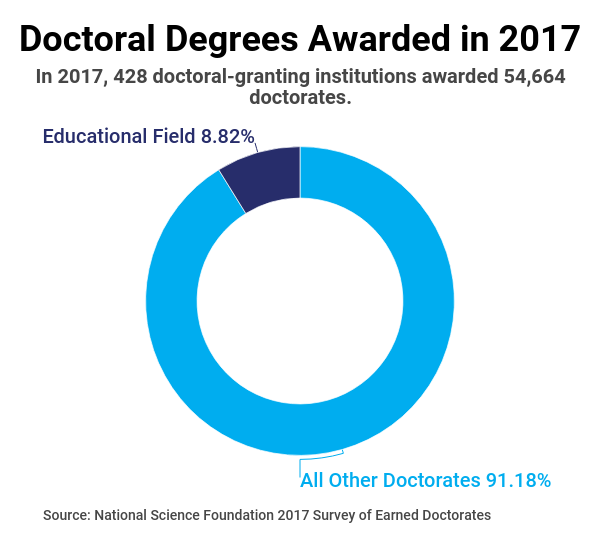 Earning a research doctorate in education prepares you for senior positions and opens the door to new opportunities. However, there are 2 main doctoral tracks in education — Ed.D. and Ph.D. — and both are often confused with one another.
Earning a research doctorate in education prepares you for senior positions and opens the door to new opportunities. However, there are 2 main doctoral tracks in education — Ed.D. and Ph.D. — and both are often confused with one another.
Ed.D. vs. Ph.D. Which Is Right for You?
- What is an Ed.D. degree?
- What Makes an Ed.D. Unique?
- Ed.D. Coursework
- Ed.D. Dissertation
- Common Ed.D. Career Outcomes
- What is a Ph.D. degree?
- What Makes a Ph.D. Unique?
- Ph.D. Coursework
- Ph.D. Dissertation
- Common Ph.D. Career Outcomes
What is an Ed.D. degree?
The Doctor of Education degree helps students gain a deep understanding of education as a field and profession. It equips learners with skills to assume administrative positions beyond traditional education institutions. Harvard University granted the first Ed.D. in 1921. Even though of 54,904 research doctorates awarded in 2016, only 1.1% were Ed.D.s. (approximately 604), it remains the second most popular research doctorate.
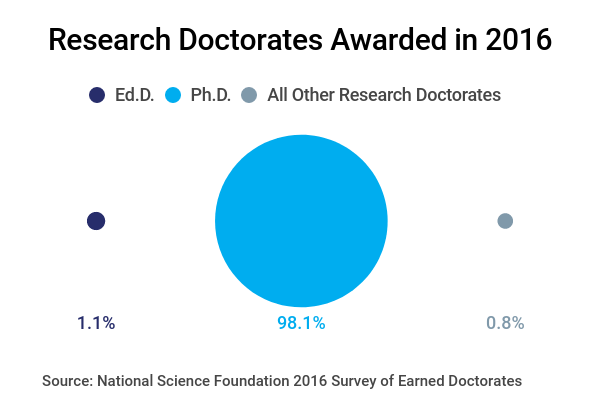
What Makes an Ed.D. Unique?
Leadership Concentration
While an Ed.D. has research elements, the program focuses on preparing professionals to be leaders in traditional educational institutions and corporate, government, and non-profit organizations.
Peers Work in the Field
Ed.D. students have a fantastic opportunity to swap evidence-based ideas and network with classmates and professors. Most Ed.D. students are working professionals. Some seek to obtain leadership roles, while others already fill senior-level positions.
Work Full-Time & Earn a Degree
Ed.D. students — many who work as educational leaders, managers, or supervisors at various organizations — have the benefit of being able to financially support themselves and their families while earning their degree. “When you’re working in the field as a practitioner, your program coursework becomes relevant and can be immediately applied,” says Dr. Ballard.
Ed.D. Coursework
Ed.D. programs usually focus on professional practice as opposed to research. It is practical over philosophical. In an Ed.D. program, you will learn different educational and leadership styles and more importantly, how to apply these constructs at this moment in time. These programs will help you understand the dynamics impacting the creation of an enduring and effective strategic plan, and lead positive organizational change around current policy and critical issues.
Typical Ed.D. coursework depends a lot on your specialization.
Using Aspen University as an example, notice the range of courses below based on the specialization chosen for the Ed.D in Leadership and Learning.
- Specializations in K-12 and Higher Education (2 separate specializations): policy-making in education, and using research to improve school policy and practices
- Specialization in Healthcare Administration and Leadership: financial management in healthcare, legal and ethical issues in healthcare, and nursing accreditation and advocacy
- Specialization in Organizational Leadership: building successful organizations that endure and how to lead in an uncertain and rapidly changing environment
- Specialization in Organizational Psychology: the social psychology of groups, how culture affects psychology, and foundations of industrial and organizational psychology
Examples of Other Ed.D. Specializations
- Educational Administration and Leadership
- Information Technology
- Adult Education
- Early Childhood Education
- Educational Psychology
- Special Education
- Curriculum, Instruction, and Assessment
- Instructional Design
- Human Resources Development
An Ed.D. program will take about 3 to 5 years to complete depending on whether you opt to go to school full-time. An online program may be the best option to utilize a more flexible schedule without interruption in your career or home life.
The average number of credits for an Ed.D. is 60.
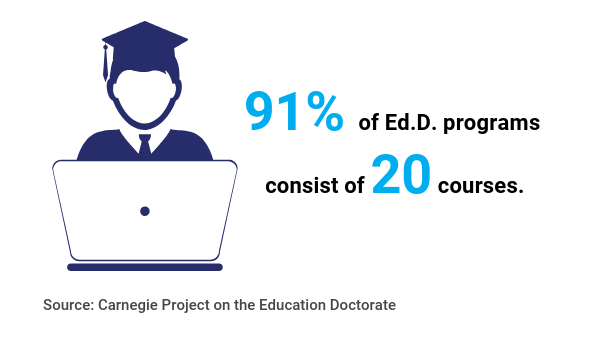
Ed.D. Dissertation
The dissertation is the final step of a doctoral program and the culmination of a student’s postgraduate studies. This is where you connect theory to practice. The dissertation is a written document — usually on a topic of your choice — that summarizes a completed research study that is grounded in theory and is methodologically sound.
Dr. Ballard adds, “For both the Ed.D. and Ph.D., the dissertation must include research that adds new knowledge to the field. The research topic and questions should emerge from existing literature as something that has not yet been examined at a scientific level.”
Common Ed.D. Career Outcomes
Common career trajectories after completing an Ed.D. program vary depending on your specializations, and the Ed.D. does not always lead to licensure. We’ve highlighted some careers pathways using Aspen University’s 5 Ed.D. specializations as examples.
- Specialization in K-12 and Higher Education (2 separate specializations): school principal, superintendent, academic dean, college president, college professor
- Specialization in Healthcare Administration and Leadership: hospital Chief Executive Officer (CEO), hospital Chief Financial Officer (CFO), hospital Chief Operating Officer (COO), nursing home administration
- Specialization in Organizational Leadership: Chief Executive Officer (CEO) or corporate administration offices, Executive Director or other non-profit administration offices, Human Resources (HR) Coordinator
- Specialization in Organizational Psychology: Chief Human Resources (HR) Officer, VP of Talent Management, Research Scientist
Through 2026, the Bureau of Labor Statistics (BLS) projects a 10% increase in the number of postsecondary administrators such as deans and registrars. This is “faster than average” job growth across all occupations. The BLS also projects an 8% increase in elementary, middle school, and high school principal jobs through 2026, which aligns with average job growth. Ed.D. students need to check with their own state departments about the certification and licensure requirements. Executive positions such as CEO, COO, Chief Learning Officer, and superintendents are expected to grow by 8%, which aligns with average job growth.
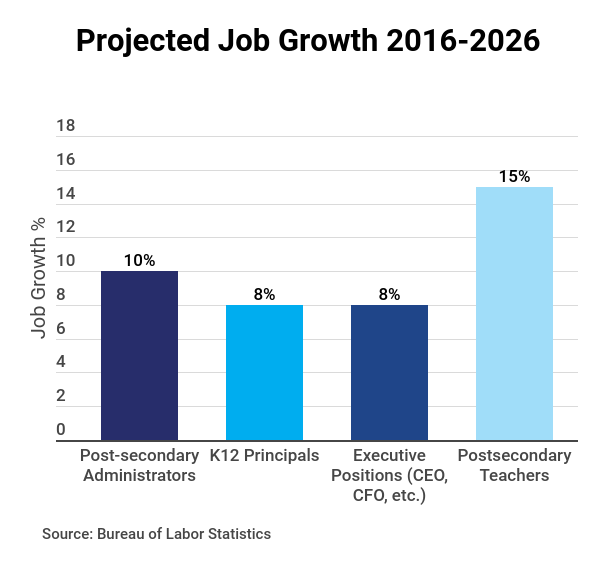
What is a Ph.D. degree?
The Doctor of Philosophy in Education is a research-oriented degree that prepares individuals for teaching and research at colleges and universities. Ph.D. candidates are active educational theory analysts and taught to apply that knowledge in the classroom. The first Ph.D. in education was granted at Teachers College, Columbia University in 1893. The Ph.D. accounted for over 98% of the research doctorates awarded in 2016.
What Makes a Ph.D. Unique?
Academic/Faculty Career
Ph.D. students seek careers where they can continue their research, pose new questions about educational theories, and develop other scholars as educators themselves. Many gain respect in their field through prestigious publication and presentation of their research. Those who pursue a general academic researcher career path have the opportunity to create centers or institutes and hire people to carry their work.
Lots of Program Options
Some aspiring doctoral students prefer a specific institution, geographical location, or faculty member when choosing a program. Since there are more Ph.D. programs available than Ed.D. program, the chances are good that there is a Ph.D. program that suits those types of requirements. For example, Teachers College, Columbia University, University of Georgia, and Walden University granted to most education doctorates — 315 combined — of any school in 2016. There are also online Ph.D. programs available.
Ph.D. Coursework
Though a Ph.D. students might start their first year or two with courses similar to an Ed.D. program, a Ph.D. is rooted in research and data collection. Students study theories about how people learn. Considered, lifelong scholars, Ph.D. candidates are trained to continue to raise questions regarding best practices for teaching and learning long after they graduate. The program is mainly self-directed with help from supervisors. Ph.D. programs are more likely to be full-time residential programs; however, online programs are available.
Examples of Ph.D. Specializations
- Special Education
- Curriculum & Teaching
- Early Childhood Education/Early Childhood Special Education
- Education Policy, Leadership, and Management
- Learning, Instruction, and Innovation
- Literacy & Reading
- Research Methodology
- Mathematics Education Leadership
- International Education
A Ph.D. program will take about 5-7 years to complete.
The average number of credits for a Ph.D. is 90 credits.
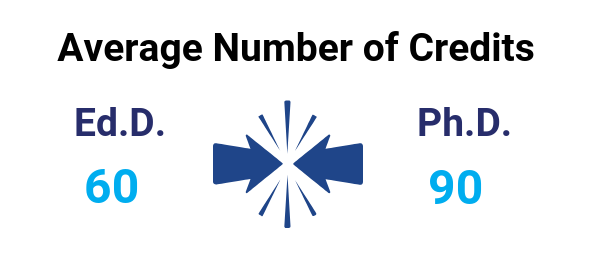
Ph.D. Dissertation
Rather than focus on the application of leadership theory and strategy like an Ed.D. candidate, a Ph.D. candidate will often have a less broad dissertation. It will also be weighted in original research. Students select a topic in their specific area of research draw informed conclusions through gathering, evaluating, and interpreting data. They examine narrowly focused elements on educational methods with the goal to apply them in the classroom.
Common Ph.D. Career Outcomes
The most common path for a Ph.D. recipient is to go into postsecondary education. Their goal is to become a tenured professor. The American Association for University Professors (AAUP) states that “A tenured appointment is an indefinite appointment that can be terminated only for cause or under extraordinary circumstances such as financial exigency and program discontinuation.” Nationally, about 2% of tenured faculty are dismissed in a typical year.
It takes years to earn a coveted tenure-position, and there is no guarantee you will reach this goal. However, job security, a steady paycheck, and academic freedom are worth the effort to many. According to the National Center for Education Statistics (NCES) Characteristics of Postsecondary Faculty, “approximately 55% of postsecondary degree-granting institutions had tenure systems.”
As reported from NCES, from fall 1999 to fall 2017, the number of faculty in degree-granting institutions increased by 49% (from 1 to 1.5 million). That number will likely grow rapidly. The BLS projects a 15% increase in the number of postsecondary teachers, which is “much faster than average” job growth across all occupations.
Of the 1.5 million faculty in degree-granting postsecondary institutions, NCES states that 53% were full time and 47% were part-time.
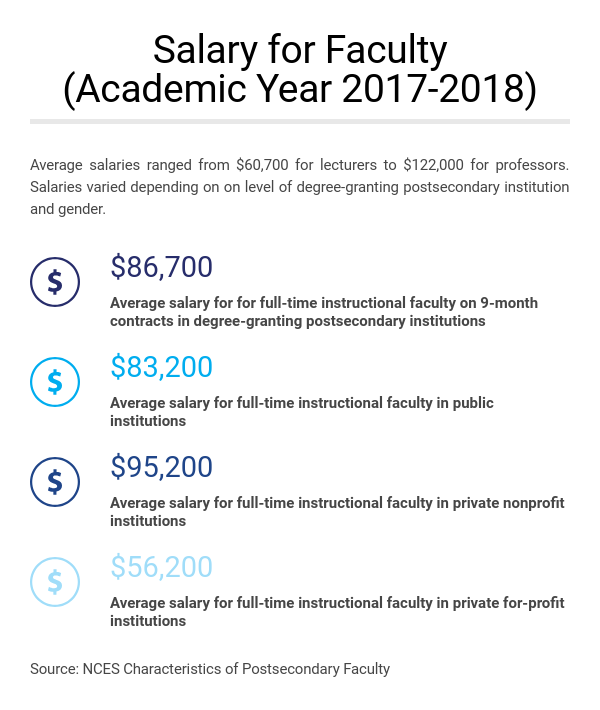
Some Ph.D. recipients also opt continue to do experimental research.
TIME TO CHOOSE
You’ve made it this far in the decision process.
Remember this:
- Ed.D.s are practical over philosophical. They often prepare people for leadership and administrative roles.
- Ph.D.s are typically research-focused and prepare people to be faculty members or researchers.
Earning a doctorate will help qualify you for some top positions in academia and beyond, making you highly respected in the field. This degree could correlate not only to getting more senior roles but to new opportunities for research or inclusion in trusted publications.
Good luck with whichever degree program you choose!

